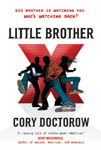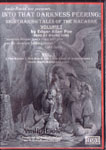
 Little Brother
Little Brother
By Cory Doctorow; Read by Kirby Heyborne
MP3 Download – 11 Hours, 54 Minutes [UNABRIDGED]
Publisher: Random House Audio
Published: May 2008
Themes: / Science Fiction / Young Adult / Terrorism / Philosophy / The Internet /
Marcus, a.k.a “w1n5t0n,” is only seventeen years old, but he figures he already knows how the system works-and how to work the system. Smart, fast, and wise to the ways of the networked world, he has no trouble outwitting his high school’s intrusive but clumsy surveillance systems. But his whole world changes when he and his friends find themselves caught in the aftermath of a major terrorist attack on San Francisco. In the wrong place at the wrong time, Marcus and his crew are apprehended by the Department of Homeland Security and whisked away to a secret prison where they’re mercilessly interrogated for days. When the DHS finally releases them, Marcus discovers that his city has become a police state where every citizen is treated like a potential terrorist. He knows that no one will believe his story, which leaves him only one option: to take down the DHS himself.
I rarely feel uncomfortable when reading a book. Cory Doctorow made me feel uncomfortable. I had a deep and growing unease as I listened to Little Brother. Talking about it with a friend, in between early chapters, I at first had a hard time pinning down exactly what was bothering me so much. But, after explaining what the book was about I suddenly realized what the one nagging issue was that was causing this growing unease: It was the villains. They were “all straw men” I told my friend, “not three-dimensional, or believable.” Their villainy “wasn’t realistic,” said I. But soon after that, in cataloging their various villainies, I realized that everything that was happening in the near future USA where Little Brother is set, was already actually happening in the United States (or its offshore territories). It was at that point when I realized that what I had at first been seeing as a poor choice on Doctorow’s part (making the villains one dimensional, completely unsympathetic, and therefore unrealistic) – was not valid. Doctorow is talking about the United States in the very same way George Orwell was talking about the Soviet Union in 1984, or Margaret Atwood, the world, in The Handmaid’s Tale. I can’t effectively argue that real world villainy is unrealistic. The villains of 1984 and The Handmaid’s Tale are not unrealistic and neither are those of Little Brother. After I realized that, my attitude of dissatisfaction changed to one of alliance with the book. And the longer I’ve thought about it, the more I am convinced. This is a book that people, especially young people, should be reading. This is an important book. It addresses in a very accessible way, some of the very pressing issues confronting our new age.
Doctorow is both revolutionary and conservative. He wants to overthrow those who would shackle us to an old business model and preserve the long and honourable tradition of revolution. In the book, Marcus, the main character, has a couple of internet handles. The first, “w1n5t0n,” is a tip of the hat to the oppressed victim-protagonist of 1984, and the second is “Mikey.” That one’s a nod towards the proactive leader of the Luna revolution in The Moon Is A Harsh Mistress. I think Little Brother takes equal inspiration from both these masterworks of Science Fiction. That’s a strong recommendation in itself. Whether this will turn out to be a tenth as influential as either of those classics will turn on how much it resonates with you. This is a book I want people to read.
Another friend, who stopped listening to the book, said Little Brother was full of “infodumps”, and he has a point. It is full of infodumps. But, I think that term gets a bad rap. Science Fiction, as Cory Doctorow himself points out, has a long tradition of the infodump, and, since this is more than just a novel, it has to have a good share of technological and mathematical explanations. In my opinion, the way the novel is written, it doesn’t at all come off as particularly hard to take. Cory Doctorow, in fiction and in real life, is a clear and concise explicator of technologies. He comes up with terrific analogies that illustrate his points, and I therefore think the charge of excessive infodumping is like saying “her hair is too red,” it says more about your predilection for blondes or brunettes than about any particular red-head’s hair colour. Check out one of the infodumps from the book:
If you ever decide to do something as stupid as build an automatic terrorism detector, here’s a math lesson you need to learn first. It’s called “the paradox of the false positive,” and it’s a doozy.
Say you have a new disease, called Super-AIDS. Only one in a million people gets Super-AIDS. You develop a test for Super-AIDS that’s 99 percent accurate. I mean, 99 percent of the time, it gives the correct result — true if the subject is infected, and false if the subject is healthy. You give the test to a million people.
One in a million people have Super-AIDS. One in a hundred people that you test will generate a “false positive” — the test will say he has Super-AIDS even though he doesn’t. That’s what “99 percent accurate” means: one percent wrong.
What’s one percent of one million? 1,000,000/100 = 10,000
One in a million people has Super-AIDS. If you test a million random people, you’ll probably only find one case of real Super-AIDS. But your test won’t identify one person as having Super-AIDS. It will identify 10,000 people as having it. Your 99 percent accurate test will perform with 99.99 percent inaccuracy.
That’s the paradox of the false positive. When you try to find something really rare, your test’s accuracy has to match the rarity of the thing you’re looking for. If you’re trying to point at a single pixel on your screen, a sharp pencil is a good pointer: the pencil-tip is a lot smaller (more accurate) than the pixels. But a pencil-tip is no good at pointing at a single atom in your screen. For that, you need a pointer — a test — that’s one atom wide or less at the tip. This is the paradox of the false positive, and here’s how it applies to terrorism:
Terrorists are really rare. In a city of twenty million like New York, there might be one or two terrorists. Maybe ten of them at the outside. 10/20,000,000 = 0.00005 percent. One twenty-thousandth of a percent. That’s pretty rare all right. Now, say you’ve got some software that can sift through all the bank-records, or toll-pass records, or public transit records, or phone-call records in the city and catch terrorists 99 percent of the time. In a pool of twenty million people, a 99 percent accurate test will identify two hundred thousand people as being terrorists. But only ten of them are terrorists. To catch ten bad guys, you have to haul in and investigate two hundred thousand innocent people.
Guess what? Terrorism tests aren’t anywhere close to 99 percent accurate. More like 60 percent accurate. Even 40 percent accurate, sometimes. What this all meant was that the Department of Homeland Security had set itself up to fail badly. They were trying to spot incredibly rare events — a person is a terrorist — with inaccurate systems.
That all struck a chord with me. I don’t live in The States, yet I know that at least some people down there are blindly accepting these “safety measures” as not only a necessary evil, but as at least somewhat effective. The last time I took an airplane in The States I overheard a conversation in which a woman was telling her family that the Transportation Security Administration’s confiscation of her own lip gloss was for her protection. And she wasn’t being ironic!
Narrator Kirby Heyborne comes from a theater, movie, and music background. His youthful voice captures Marcus and his friends in an effective straight reading. This is audiobook narration as it should be. Two interesting afterwords by people mentioned in the book and a detailed bibliography cap the novel. There is no hardcopy edition of this audiobook available, but a DRM-free MP3 download is. GET THAT HERE.
Posted by Jesse Willis

 “Anda’s Game”
“Anda’s Game”





